The ending of Samurai Champloo is a mix of emotions. The journey is over. Trials are completed. Fuu, Jin, and Mugen part down their separate roads. It is a happy yet also sad ending. Despite everything they faced, and the friendship they forged with each other, they walk away without even a glance.
 That is exactly the point of the ending, and the show.
That is exactly the point of the ending, and the show.
People come and go throughout the characters’ journey. Each leave a mark on them, and the road carries everyone away. Life is full of meetings and partings. Each of us has a road only we can walk, just like Fuu, Jin, and Mugen. Sometimes the roads are the same, but eventually everyone will find their own. It is a very Zen message.
The ending leaves us viewers feeling off; we expect a ending where everyone lives together happily ever after. Instead the anime ends like it began: 3 people….alone.
The ending is far too realistic for viewers to accept. Relationships are more tenuous than we like to admit. Like the characters Fuu and the guys meet on their journey, we too meet hundreds of people only once. We too just walk away.
It is simply a fact: all things must end. Even the best of friends or lovers must someday walk their own path alone. Death, like life, is a personal experience. The truth of ending is distorted by our illusions of continued connection through email, social media, movies, anime, and other media. Samurai Champloo, despite its odd mash of hip-hop, Edo period and reggae, is a great allegory for how life works.
Most of us like to think Mugen finds the detective woman who claimed him as a husband. Jin will return to the island and live with his redeemed prostitute. Fuu will…well, get kidnapped and pulled into some other adventure. But happy endings are not certain in the violent world of Samurai Champloo. Only this short part of their individual journeys are remembered. They walk away from us, leaving us only with our memory of them.


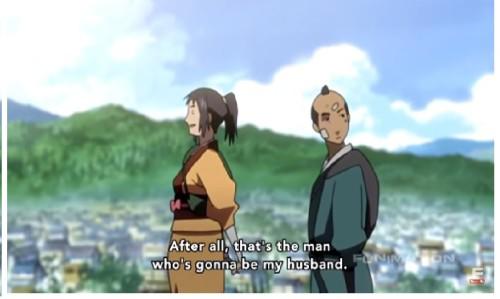
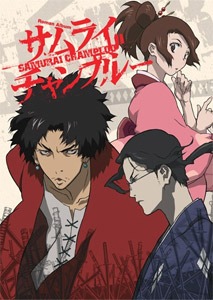
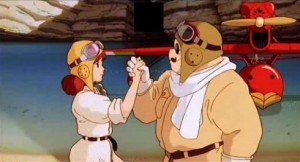
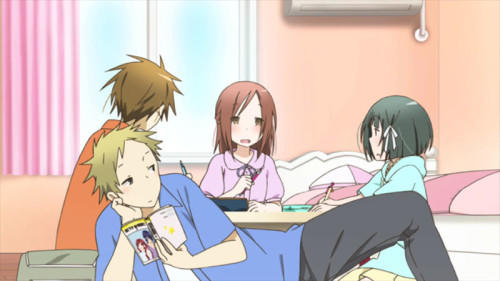
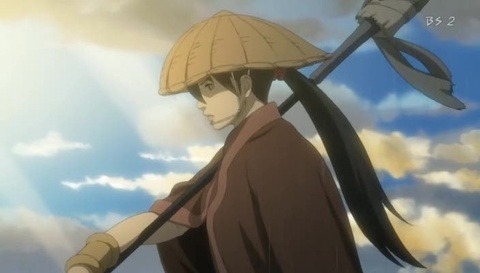
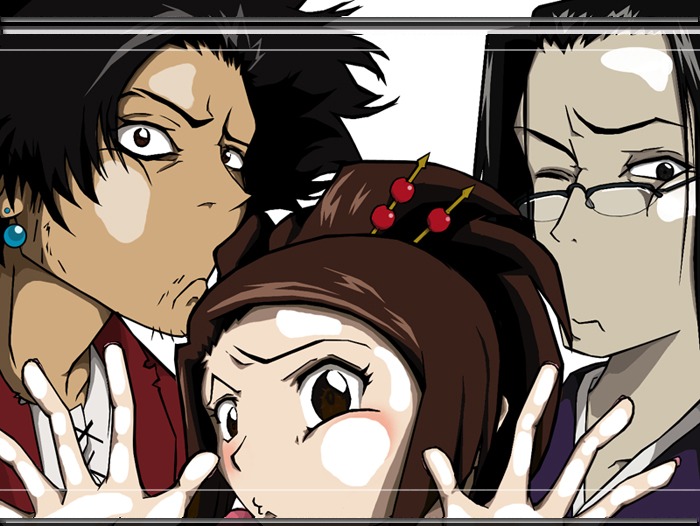
Re-watched and had to give my two cents. Here it is:
All three (Fuu, Jin, Mugen) met at a crossroads in which they were all setting off on their own ‘running away’ or ‘reaching the next chapter’ stage of their life. Much of the narration came from Fuu’s perspective, given that her life was just starting out I kinda get why Watanabe chose to focus on her perspective. Jin and Mugen had previously lived a rough life – meeting Fuu at a time when they had to leave their previous life behind. At a time where the lives and tradition of Samurai was closing out and the era of guns and western colonization was creeping into Japan, the trio were seeing the world change before their eyes while they tied off loose ends on their own paths. Some of the anti-climatic moments- esp with Fuu and her father and the ending where they all split up- was so real! We all kind of build up these long arduous thoughts/feelings/potentials of ‘what will be’. It’s not until we realize those moments we get to see that they’re not even close to your imagination yet that’s still surprisingly human.
Regardless, the road to Fuu’s father changed all three of them despite Jin and Mugen’s journey’s being described as ‘aimless’. They ended up half dead on Fuu’s fathers death bed calling truce. I mean why would Jin and Mugen want to kill each other when they’ve seen each other meet their maker multiple times on the same journey. They were saved on multiple occasions by the sudden realization of their foes being tricked into hunting them or no longer finding purpose in killing them (re. blind lady or assassin going after Jin). It all gave a slight nod to the overwhelming powers that be controlling what ‘needs to be done’ whether for power, money, honor, etc. Just to end with a ‘no bad blood’ ‘it’s not about you i just had a job to do’ type of end.
This time around- I really felt how human their story really was. None of the overdone dreamscapes or filler just shit happening and, although they didn’t know why, they kept going. I think all three of them, despite all three being skeptical about Fuu’s search for the ‘samurai that smells of sunflowers’, felt the pull to follow Fuu on her journey. Eventually Jin and Mugen confronted stuff that put mad respect on Fuu’s name since they wouldn’t have gotten to complete those important side quests if they hadn’t followed her. Plus, Fuu is an unexpected badass! I know folks speculated some sort of romance between her and the guys but all I saw was respect (and them clowning her like a little sister). Anyways, in my mind Jin and Mugen go back to the ladies they left behind and Fuu well… given that she’s got no fam I hope she gets to make a proper life and not end up at another brothel >.<. I'm sure that's what her father would want since he literally left to protect her and her mom after being persecuted for being Christian. Now that she's not hung up on him so much she can think about what she wants for herself #daddyissuessolved(maybe). I'm a big fan of shows that don't drag shit out or rush anything so I'm almost glad their journey ends there.
Thank you for sharing your thoughts! Samurai Champloo, despite its wackiness, feels grounded. Fuu is a good example of a strong female character, one that isn’t strong by masculine definitions of strength.
This is one of my most emotional anime ending but we have nice memories of journey of all three character all 26 eposodes just like we are part of their journey😭😭😊
The anime leaves you with a strong impression. One that I suspect would be less if the ending was different.
As many i expect the Western/Disney …and happily ever after…. especially after Jin says that he found a friend and Fuu struggle with the idea of being without them. At the same time Mugen and Jin tried to leave on other own often hinting at what they really feel like, also Fuu wasn’t the kind of girl to wander endlessly neither Mugen would work and have kids i mean he didn’t even took Koza with him , no matter how much the writers toy with us making us think that Fuu was in love, so being together at the end is no more than a previous expectacion from the viewers. Each one of us is free to create an after story of what we would like since the part ways ending shows them going into their new lives even when there is so much to be told.
You are right. Their separate journeys may not cross again. This emphasizes the point that relationships are transient.
I just stumbled upon this after finishing the series today, and I was taken aback by the ending as many others were. While I might have enjoyed a more conclusive ending, I like the all theories that have sprouted up in its place. Perhaps they go their own ways and find closure, or maybe they even end up back in each other’s lives. Either way, the show is so well crafted people are still talking about it over a decade after it’s finished! Overall, I enjoyed this series. While I may have watched Samurai Champloo when I was younger, I appreciate it a lot more now.
Yes, the fact that people still discuss Champloo 10 years later says much about it. It aims at an older audience than most anime does.
I feel the ending is kind of misinterpreted or it has some other way to look at it. Following the realistic and tragic approach of the whole series like the man who was not accepted because he looked like a monster gets killed and even the boy stealing for his mother’s medicine is not able to accomplish anything and dies. The ending I interpret is that both mugen and jin dies following their suicide attacks and accomplishing their goal of helping fuu in their seemingly purposeless lives. Whatever is shown forth is a mere dream that fuu unable to take the burden of sorrow makes up or dreams so as to keep moving forward. Or maybe mugen and jins dream cause they finally find a family and happiness which they so long sought out for. Another evidence supporting this ending is the servant who is killed by kagetori and yet is appears in the end along with them.
Feel free to disagree and prove me wrong.
I’ve seen that interpretation before. Although Kagetori was charged with killing the retainer, I don’t believe he did. He just knocked the old man aside to go after Fuu. The sound effect didn’t have the usual killing sound associated with sword blows used throughout the series. Rather, the foley reflect a body blow often used for when Mugen or Jin struck people. Kagetori knew the retainer would need to be around to bury Fuu and her father. Likewise, he knew a samurai retainer like the old man would commit suicide for failing to defend them. He had no need to kill the old man.
Other than the bad mushroom-trip episode, Samurai Champloo avoids dream sequences. It remained grounded in present events. I surmise the ending we see isn’t a dream because of this consistency in storytelling.
You seem right. Maybe I was overthinking it. Thanks for the active response though.
Supposed realistic endings like this one that permeate the world of Japanese storytelling are a sign of the writers hubris. We are all supposed to be evolved enough to come to grips with letting go of sentimentality, as is voiced by the two male leads making fun of Fu’s “woman emotion” around a campfire along the journey. This is pretentious at best and fatalistic nonsense otherwise. Japanese culture as depicted through their storytellers anyways, tries to fight the very best feelings humans can possibly experience and I find this extremely sad. Denying the very nature of ones self in order to appear ‘strong’, essentially, is to throw away all that is good in this cruel life. The way they abuse their own character creations they took so much time to flesh out in wonderful ways in an attempt to toy with the viewers emotions is a cheap tool not befitting the talented team responsible for the show’s creation. It is not edgy or smart and teaches me nothing we haven’t experienced in life many times already. Mugan’s detective lady finding him during an episode, or all of them coming to terms with her clear emotions for this new little family they have found would have made for better screen time than the annoying waste of an episode spent in zombie country. I continue watching anime because I love the character development and creative art. But I will always internally snicker at the writers foolish pretense on display by way of the cheapest tricks and just feel bad for anyone actually thinking like the characters in the end of Champloo inexplicably do at the last second for no ‘realistically human’ reasons. Nobody in a world as violent as this, with no other real human connections would choose to go their own directions with smiles on their faces. Period. Not too many men that capable and that descent at their core would leave Fu to be accosted and sold into prostitution; as that is what would clearly happen within this ethos. And no woman would walk, smile and a sense of emotional strength in tow, towards such a fate that could be averted either. Period. It’s terribly ‘unrealistic’.
Samurai Champloo and other stories with similar endings continue the traditions of Japanese literature. Most folk stories end with some sort of parting. “Happily ever after” endings like we see in the West are relatively rare in Japanese folklore and literature. The parting theme comes from Buddhism’s influence and the seasonal focus of Shintoism.
The writer says relationships are more tenuous than we believe. The writer also says the ending represents the reality of how people meet, become acquaintance s and possibly even friends, and eventually as time goes on the each go their own separate ways. I know this to be reality but as of how tenuous relationships really are, I cannot decide. That said surely you must agree that the writers take regarding the ending seems to apt to be false. To me it seems clear that those were the intentions of the writers of the anime.
The characters spent all that time building up their friendship, even Jin says they were the only friends he ever had. They risked their lives for each other. And now, when they’re all better, they just split up?
“Everyone Dies” is just a cop-out.
Most people I know like a happy ending, where all the heroes ride into the sunset together.
We don’t need that nihilistic bullshit shoved into a happy ending at the last minute. Everyone has thoughts about life and death, and whether any of it has meaning. This is about Themes and patterns.
It would be like falling in love with someone, marrying them, having children, and then murdering them all in their sleep. It’s jarring and makes no sense.
I don’t consider the ending nihilistic. Rather, I see it as life affirming. I explain why in another article.
I Feel Like The Ending Was Seen Through Mugen’s Imagination. I Think He Died And We Just Saw The Way He Thought Things Were Going To Turn Out. The Old Man That Got Killed Right Infront Of Fuu As She Was Running Kinda Hints At That. He Died, But Then He Was Praying With Fuu At Her Fathers Grave? Just My Interpretation Of The Ending Though.
That’s an interesting interpretation.
I thought about that, myself, with the old guy, but I don’t think the assassin actually killed him. He gets put-down, yes, but we don’t see any blood.
What I was more confused about was Episode 22, where they were all supposed to have died. Then, Episode 23 comes and everybody acts like nothing happened.
I don’t know how else to look at it other than a filler episode that one of the characters dreamed or something.
The assassin doesn’t appear to kill him. This is an interesting violation of his orders because he was told to kill the retainers too. This act of compassion (allowing the retainer to remain to offer a proper burial for Cecil) speaks much about the assassin’s character and sense of honor.
Episode 22 is an odd one, but there is a hint. On the road, they eat those mushrooms. It seems they take a mushroom trip. All of the hints of mushrooms (including the odd-shaped wasabi and the final mushroom cloud explosion) point to this. It is a throwback to Cowboy Bebop and the Space Lobster in the Fridge episode.
Would’ve worked as an ending if they actually showed them deciding to go their separate ways, since they were obviously fond of Each other and, just like in life since you love the metaphors, people don’t just split unless there’s a reason.
Many people felt unsatisfied with the ending for similar reasons. The characters split because their personalities and desire to keep on traveling served as reasons. Jin had his lady friend to wait for. Mugen was always a vagabond while Fuu wasn’t really suited to a life of endless travel. The anime wants us to read between the lines. There’s quite a bit of subtext and hints toward the ending throughout the series.
While I believe your interpretation of the ending to be great and probably the most accurate, upon immediately finishing the show I felt so different about it. There were so many instances in the show where the three of them split up in ways where it seems like they were completely done with each other just like the ending, walking separate ways or purposefully ditching each other but their paths end up crossing again due to certain circumstances. The theme of fate/destiny is prevalent in the show as well and upon them walking away I couldn’t help but laugh and think to myself “they will end up together again somehow”. I love hearing your take on it and find both our interpretations to be a positive one!
The characters meeting again remains a good possibility. Many people felt dissatisfied with the ending, but the story tells us what happens to each after they leave the screen if we pay attention.
Imma be honest, I could not see Mugen/Fuu or Fuu/Jin as a couple. There was a time where I lowkey shipped Mugen with Fuu but after watching several episodes, I just saw it as just friends being teasing to each other. Looking back at it, Fuu reminded me of me when I had guy friends. I had this one guy friend and people would think think we should date and such, but I couldn’t see that happening. Fuu to me represented a person in a group of friends that had romantic tensions because everyone else in that friend group already had been in a relationship. Fuu and that one guy who got killed seemed to me like a good romantic pairing. Had he lived he would have been good with Fuu. And Jin with Shino was another good romantic pairing that could have also worked. And last Mugen and Yatsuna were another romantic pairing that could have DEFINITELY worked out. Those two were practically made for each other. I believe that Mugen, Fuu, and Jin were such good friends that they looked like they were practically flirty towards each other if that makes sense.
You make a good point about the romantic tension. Some of that is because of our expectations. We are trained by storytelling to see two guys fight each other over the girl when in a situation similar to Samurai Champloo. The writers toy with this expectation with the friendship between the three, but they never fall into the tired story pattern we expect.
Honestly, I’ve thought about the ending quite a bit. I don’t dismiss endings just because they are vague or don’t end the way I want them too, but with Samurai Champloo I always felt like something was missing. The feeling hasn’t gone away even a year and half after watching it the first time and again after watching it the second. What bothered me was the inconsistency with the show’s themes. If Cowboy Bebop was about the consequences of being shackled to the past, Samurai Champloo was about confronting the past–but by *building a future with real people.* I get it. People move on–but usually because they have families, goals, schools, the trappings of modern life. And even then, I wish there was a show about that being a *choice* on our part even more than those few relationships that inevitably fade. But these characters didn’t have families or goals. They were free to make new ones. The show never established any lasting goals or futures for these characters–we journeyed with them as they created new lives for themselves. Mugen learns to read, is loved for the first time in his life, literally cuts ties with his past, makes peace with not having to be the toughest guy in the rom. Jin even found love and a possible dojo–but that lady wasn’t leaving the convent for a while, if I remember correctly. Mugen, unlike Spike, is not beholden to his past via a hydra-like syndicate. And Fuu probably has less than them, by historical standards. She’s still an orphan and she’s still a woman–not even that, a girl. This journey was about her growing up. At the end of the show, the characters finally have full freedom and choice. And the choice they make baffles me because it completely sweeps the rest of the emotional weight of the finale under the rug. Fuu being torn over leaving her friends (and yes, there’s some romantic tension there, but I’m not saying that SamCham should have had a shippy ending), Jin and Mugen transcending their rivalry, Mugen symbolically losing his bloodlust by throwing away his sword–twice. I mean, the end doesn’t say they never see each other again, but it implies that that might be the case. Makes you wonder what conversation they had before getting to that crossroads. Makes you wonder what that dang bird stands for. Do I think this was the best ending? Well, I think it’s an ending. And I don’t think the show was locked into “this is real life–this is deep–enjoy the heartbreak and nostalgia.” But it’s not a story that harked back to any of its themes by being open-ended (like “Inception”). So, I keep my fingers crossed for a movie sequel plot to lodge itself into Watanabe’s brain and be released some time before I die. With Manglobe gone to insolvency, I’m not sure if that’ll happen–but if they can make a Trigun movie in 2010 and resurrect Hey Arnold! then I have some hope. Thanks for your thoughts on the series–I’ve been scouring for intellectual discussion on this. Champloo is a show that snuck up on me and I can’t even tell you when it became my favorite, flaws and all.
Thanks for your great analysis and view! I actually wrote a second article on the ending where I explain the possible paths the characters may take. The story hints to their future. Throughout the story, the actions of the past determined future events, as you point out. It stands to reason that this theme will carry forward to events beyond the ending scenes.
All said, the ending succeeded in how it still garners discussion and reflection.
Thanks for your analysis. It really gets at what’s missing from this show and the ending in particular. Like you, I’m very glad I watched this show. Like Bebop, it’s unlike any other anime ever made, and I’m so thankful it exists, but appreciating art also means critiquing it, and I don’t think the show ties its themes together (or builds characters that are detailed enough to hold up those themes) as well as Bebop.
Your comment was a great read. There’s not enough thoughtful analysis out there of anime in general and this show in particular.
Best regards.
In Bebop, Spike’s background gave the story something to attach onto. Samurai Champloo doesn’t really do that in the same way.
The way I view the ending is like this, first of all the adventure they’ve been through has build strong bond that is for sure. Also I feel that the characters grew to become better as along they way they face many many challenges, which gave me the satisfaction of them growing up and becoming a better person at the end.
Although the ending is bitter, I felt like wherever they go, they are happier than they are before the samurai champloo as many of their problems are solved and they keep the past in the past and keep going on forward. It is a excellent message for me as it is related to real life to improve as a person and realize that there are many things I can do before I die.
I agree. Fuu, Mugen, and Jin parted as better people. Great stories change us. They force us to consider ourselves. Samurai Champloo’s ending is a good example of this.
but the shogunate are still after fuu,mugen and jin so what i hope will happen/ what i believe is that Fuu gets captured then jin and mugen reuite so save her, then later on in like another 25 episodes mugen becomes the emporer of japan, jin becomes his advisor/bodyguard (not that he needs one :P) and fuu becomes a court lady, 😀
A sequel is possible. I laughed at the idea of Emperor Mugen. Poor Japan! However, Shinichirō Watanabe seems reluctant to create full on sequels.
I have to say, though it is the most realistic outcome in terms of them actually parting – I really did want them to stick around together. Like Jin said, they had become each other’s friends. Personally, I’d like to think that they end up meeting again and traveling around since in the show every prior time they parted they (hilariously) got stuck with each other again. And they’ve been through so much together, I could never forget anyone I’d be through so much shit with.
I still cried though… So hard.
Every time I watch the ending it has an impact on me as well. The final credit scene that shows each of them walking their own paths is bittersweet.
I wanted fuu to turn around crying to mugen and jin, them huffing in annoyance but deep down happy lol but damn wat a mind fuck
Just finished SC last night. A very good anime, I’m sad it’s finished now considering many of the episodes were well done especially the fight choreography, music and its social critics. IMO Buddhism (in its Zen or Pureland variation) has become entrenched in the Japanese psyche specially by the Edo period. However, the ending is quite appropriate considering the irreverent and anachronistic style of the narrative. Stories where the samurai characters die at the end are the norm. SC is not. It’s an upbeat, and at times melancholic siesta of colours, sound and perspective. I love how it gives precedence to the underdogs or the persecuted in Tokugawa era, just like famous chanbara series like Zatoichi or Lone Wolf & Cub. But SC went further than that by presenting stories that even those older chanbaras rarely touch upon such as persecution of native tribes & Japanese Christians by the shogunate. But the bigger caveat is that Mugen is an Okinawan. Considering they are still heavily discriminated today in Japan, the anime series reverbates with an even more relevant social commentary.
Samurai Champloo nicely looks at rather delicate themes like Christian persecution and other discrimination. Samurai Champloo should be considered an anime classic on par with its cousin Cowboy Bebop.
Sorry for very very late post, I just recently finished watching Samurai Champloo.
There’s only one thing in my mind when they’re all went separate ways at the ending… open ending and possibility of season 2. Fuu said it, right? That she hope they all can meet again sometime. And seeing they often magically meet each other again even went separate ways several times before… this is a good set for season 2 and a good ending at the same time.
It is a bit of a teaser. They seem to expect to meet again. The ending does show us that their lives go on. They continue much as they did before they met.
IMO, the creator just kinda take a “safe” way, providing a good ending while providing a good set for season 2 (which could be made in the future or will never be). SC could end in so many different ways but yet they end it in a kinda rushed and forced way. Well, the ending itself is not bad though (and far better than some anime ending out there).
IIMN, Jin once was trying to suggest that he want Fuu to keep together with him but Fuu rejected him by mentioning Mugen. And there’s also plenty of hint that they could be together even after the journey ends.
IMO, current SC ending can give better set for season 2 compared if they’re still together at the end.
I can see the possibility for a second season, but I don’t see any true loose ends to hook into a second season. The ending didn’t feel rushed to me. It followed the format of mini arcs and the theme of the past returning. The shogunate showing interest in Fuu felt a bit odd, but there were hints throughout the series. Open endings are quite good at sparking debate.
You don’t always need strong continuity from 1st season to make 2nd season. Sometimes a brand new story featuring same characters can be considered season 2.
Just like I said, SC ending is good as it is right now. They do tie almost all loose ends there; Jin story, Mugen story, smelly samurai. All the three characters story. That’s why by end it in such open ended way, it gives a better set for 2nd season story… but hey, this is just my opinion.
You make a good point about strong continuity not being necessary. Ghost in the Shell is a good example. The trouble the three cause could easily lead into a second season. I am not opposed to one by any means- if done well.
isn’t jin supposed to be running that dojo where all the graffiti happened?
No one ever mentions that.
I think the ending was left open ended so the audience would be able to think more in depth about what happens after the credits stop. And maybe that sort of ending fits the over-arcing theme whatever that might be. Life, death and rebirth?
One theme that was constantly repeated is, no matter how much they tried to part ways they couldn’t. I don’t know if that was to show that Jin and Mugen were unable to escape their debt to Fuu until it was paid, that they needed eachother in order to grow in the ways they did in the course of their time together, or that their destinies are forever interlocked.
It definitely seems weird that the three of them spent their whole lives to this point alone, finally find companionship then split up peacefully. Also the shogunate probably still wants the three of them dead.
I probably have to watch the whole thing again to figure it all out.
It is possible Jin returns to the dojo; however, the brothers had moved on from their father’s legacy to make their own path. They left the dojo behind so Jin could become the master there.
I can’t think of any other way for the series to end. Their parting shows that their lives were continuing; perhaps they will meet again.
I am uncertain if the shogunate still wants them dead. The main goal was to kill Fuu’s father. It was accomplished. The fact Japan’s best swordsman was killed would give them pause as well.
The series has quite a bit of depth; you can also fill in the gaps and ending in many different ways.
I never did find the ending that sad, really. At least not compared to my expectation, having gotten used to shows pulling “EVERYBODY DIES LOL” out their ass.
I’ve seen many otherwise good anime that ruined themselves with that “Everyone Dies” nonsense. They have a bad habit of doing it off camera in the final minutes. I don’t find those types of ending sad; they are annoying, and they make me wonder if the writers simply didn’t know how to write a good conclusion.
It was hard to accept, even as I told myself it only made sense. Road movies like this (not a movie, but you know what I mean) lead us to expect that the trip will go on forever. Tsukikage Ran (an old Chanbara-style anime) looks to me like the ancestor of Samurai Champloo, and it ends, as you expect, with the quarrelling leads disappearing over a hill.
I think the director really nailed the ‘realistic ending’ in his next series, Michiko to Hatchin.
In the last decade there has been a lot of obvious Zen influences in anime. Particularly I am seeing the ideas of “brokenness.” Everything has to end or break; it is best to view everything as already broken or ended because of that fact. Of course it could be I am just more aware of it since I began studying Buddhist thinking. Samurai Champloo is just one of the more obvious ones.
Cowboy Bebop also had a lot of Zen elements when I think about it.
I’ll have to check out Michiko to Hatchin sometime.
I know your comment is over a year old and you probably won’t see this, but I think you wrong. Nothing ever ends or breaks. The “brokeness” you speak of is only an illusion; everything is one, and everyone is connected.
There is no such thing as separation, because we are all one. Samurai Champloo had a multitude of messages. I liked this review of its ending and the series. A key element of this show though was the learning of lessons; that word was brought up many times throughout the anime. The people who enter our lives enter for a reason. This is why no matter how many times the trio separated, they always reunited. They had lessons to learn from each other in order to reach the next stage of evolution. When they learned what thy needed to learn from each other, they were finally able to part ways. All three were very different people before meeting one another. I believe we are all the creator, living life through different perspectives to learn and experience different things in order to work our way up. We are literally one and connected. I’m very fond of Buddhist teachings as well, but I’m positive we are connected with every sentient and non-sentient being around us.
If you live your life thinking things are broken and will always be broken, you segregate yourself from others and the true connection we are capable of having with everything around us. Food for thought.
When I wrote about brokenness I was referring to the concept of impermanence. Nothing is constant. Everything must end, including endings. I agree that everything is one, but at the same time for every meeting there is a parting. For every parting there is also a meeting. What I wrote about brokenness and ending was actually words of the Dalai Lama.
The trio learned much from each other. Although they parted, they will meet again.